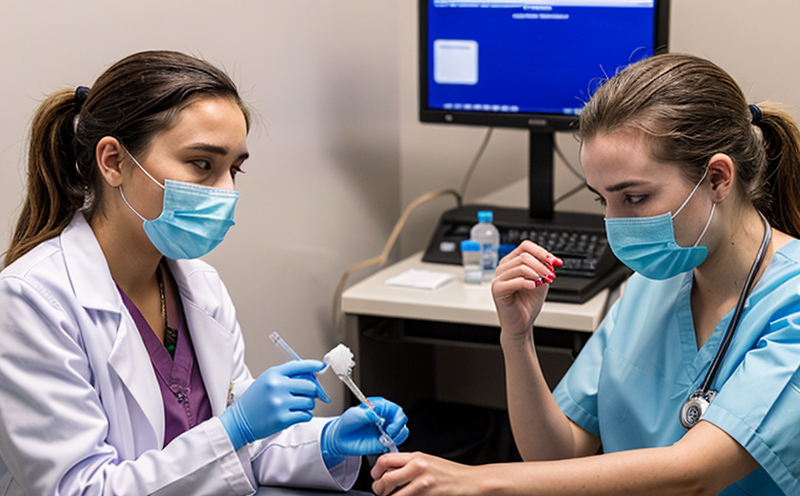EN 15789 Vibrio spp. Detection in Clinical Testing
The European standard EN 15789:2009 provides a standardized method for the detection of Vibrio spp. in clinical samples, which is crucial for ensuring patient safety and public health. This standard outlines procedures to ensure accurate identification and quantification of pathogenic Vibrio species that may be present in various clinical specimens such as water, food, and environmental samples relevant to human health.
The significance of Vibrio spp., especially Vibrio cholerae, cannot be overstated. These bacteria can cause severe gastrointestinal illness, including cholera, which is characterized by severe diarrhea leading to life-threatening dehydration. Detecting and identifying these pathogens early in clinical settings allows for timely intervention, reducing the risk of outbreaks and ensuring proper patient care.
The testing protocol specified in EN 15789 involves several key steps: sample collection, pre-treatment if necessary, inoculation onto selective media (e.g., thiosulfate citrate bile salts sucrose agar), incubation at specific temperatures for optimal growth, and finally, the use of diagnostic reagents or confirmatory tests to identify the presence of Vibrio spp. The standard emphasizes strict adherence to aseptic techniques to avoid contamination and ensure accurate results.
The importance of this service extends beyond just detection; it plays a critical role in public health by facilitating early diagnosis, enabling appropriate treatment regimens, and preventing the spread of infection. Compliance with EN 15789 is mandatory for laboratories involved in clinical microbiology testing to ensure that they meet international standards of quality and reliability.
Compliance officers and quality managers should be aware that failure to adhere strictly to this standard can lead to legal ramifications, including fines or even closure of the facility. For R&D engineers focusing on diagnostics, understanding these protocols is essential for developing new tests that are both sensitive and specific in detecting Vibrio spp.
In summary, the EN 15789 standard ensures consistent and accurate detection of Vibrio species, which is vital for effective clinical microbiology testing. By leveraging this standard, laboratories can provide reliable results that contribute significantly to public health initiatives aimed at preventing infectious diseases caused by these bacteria.
Eurolab Advantages
At Eurolab, our commitment to excellence in biological and microbiological testing ensures that we deliver accurate results consistently. Our team of expert scientists and technicians is dedicated to providing services that meet the highest standards set by international regulations like EN 15789:2009.
- Accurate Results: Leveraging our advanced instrumentation and strict adherence to protocols, we ensure precise and reliable results every time.
- Expertise: Our team includes microbiologists with extensive experience in clinical testing and diagnostic procedures.
- Compliance: We are fully compliant with all relevant international standards, including EN 15789:2009, ensuring that our services meet the highest quality benchmarks.
We understand the critical nature of our work in clinical microbiology and strive to provide services that contribute to public health initiatives. Our comprehensive approach ensures that we deliver results that are not only accurate but also actionable for healthcare providers.
Competitive Advantage and Market Impact
Eurolab’s expertise in biological and microbiological testing, particularly in the area of clinical microbiology using EN 15789:2009, places us at the forefront of our industry. Our services are highly valued by quality managers, compliance officers, R&D engineers, and procurement teams who rely on us for accurate and reliable results.
- Market Leadership: Eurolab is a leader in providing accurate detection of Vibrio spp., which is crucial for public health initiatives.
- Client Satisfaction: Our clients consistently report high levels of satisfaction with our services, due to the accuracy and reliability of our results.
In the competitive landscape of microbiological testing, Eurolab’s strict adherence to EN 15789:2009 sets us apart. This ensures that we are not only meeting but exceeding the standards expected by regulatory bodies and healthcare providers. Our services contribute significantly to public health initiatives aimed at preventing infectious diseases caused by Vibrio spp.
Use Cases and Application Examples
The use of EN 15789:2009 is critical in various clinical settings where the presence of Vibrio spp. needs to be detected. Here are some examples:
- Water Quality Monitoring: Ensuring that water supplies do not harbor harmful Vibrio species.
- Food Safety: Detecting Vibrio in food products to prevent contamination and ensure product safety.
- Hospital Infection Control: Identifying Vibrio spp. in clinical samples to prevent nosocomial infections.
In each of these scenarios, accurate detection is paramount for effective public health measures. By leveraging our expertise in biological and microbiological testing, Eurolab plays a vital role in ensuring that healthcare providers have the information they need to make informed decisions about patient care and infection control.





